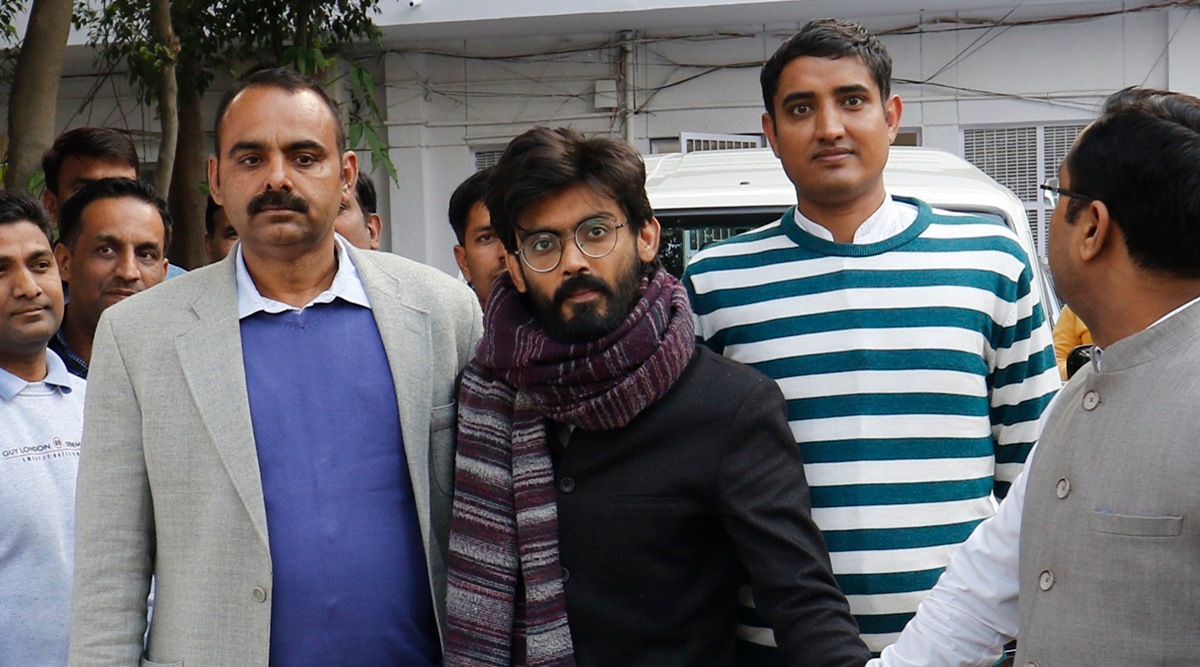 The advocate argued that Sharjeel Imam (centre) is not a member of any banned organisation or a terrorist gang but only a student. (Express archive)
The advocate argued that Sharjeel Imam (centre) is not a member of any banned organisation or a terrorist gang but only a student. (Express archive) Arguing for bail in a UAPA case in connection with the northeast Delhi riots, JNU student Sharjeel Imam told a court Monday that without criticism a society dies and turns into a heap of sheep.
Advocate Tanvir Ahmad Mir, appearing for Imam, said there was nothing in the impugned speech made by him which “directly or indirectly calls for violence”. He was wrapping up arguments in the bail hearing before Additional Sessions Judge Amitabh Rawat.
Imam was merely exchanging his thoughts with students, he said. “What society will be a society if it’s not robust or what doesn’t react. It will be a heap of sheep.”
Mir told the court that as per the prosecution, “Sharjeel deserves to be booked and kept inside a correctional facility because he gave this speech… it is totally fallacious. What the speech conveys is – block the roads, do chakka jam and rail roko andolan so that people are not able to traverse.”
“I was astounded to see the investigating officer calling him bigoted just because he seems to criticise the Constitution of India… We are proud of our unity and not majoritarianism. Critical elements in our society are also necessary because in a society where criticism will die, the society will die. That is why, ultimately, the flag to uphold the Constitution in a democracy securely lies in Your Honour’s hands,” he said.
He also pointed out that “when Sharjeel says that CAA is per se unconstitutional, prejudicial against one community and persuades the govt to rethink” and says that if it does not reconsider its decision “we will be on the streets, he can’t be hammered with sedition.”
“Fundamentally the right to protest, bring the country to a standstill is not at any point in time equal to an act of sedition. We went together through the contents of the speech. The petitioner at no point of time has said that you should resort to violence,” Mir told the court.
“In terms of settled principle of law, the speech has to be looked up in its entirety. Per se a protest against NRC CAA, by no stretch of imagination in a democracy that we have in India, can be termed seditious,” Mir said, arguing that Sharjeel is not a member of any banned organisation or a terrorist gang but only a student.
He told the court that the “investigating authorities cannot abdicate their legal, moral or other responsibilities in following the constitutional mandate which is that they can book a person when it’s justified.”
Judge Rawat said every speech has a viewpoint. “…but will it make a difference if the speech is delivered in public, a hall or privately? Will these factors make a difference?” he asked.
To which Mir said the charge of sedition has to be applied in a proper manner. For instance, if a speech that incites violence is given behind closed doors and then shared on a public domain, it will certainly lead to indictment.
The judge then asked if the kind of listeners present will also make a difference. “For example, people who are educated and participating or where someone is speaking and others are only listening?” he sought to know. “Their reference is to Gandhiji, members of other political parties. That is why I asked, will it make a difference if you’re addressing a crowd, people who are not as intellectually sound as you are?”
Mir told the court that it does not make a difference and that they have to see where the speech was given. “Whether the speech is given… where people were carrying sword or where there’s an intellectual debate between students of a university,” Mir said.
“Everybody has a fundamental freedom in subjecting any part of the Constitution to criticism or to support it. Courageous men in this country will not be slapped with sedition. This is what our solemn duty is. Sharjeel Imam’s view is not hostile,” he explained.
The prosecution will rebut Imam’s arguments on September 1 and 2.
- The Indian Express website has been rated GREEN for its credibility and trustworthiness by Newsguard, a global service that rates news sources for their journalistic standards.

